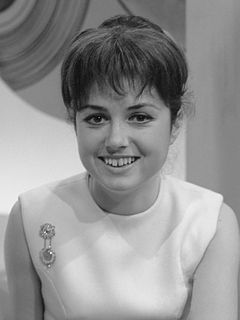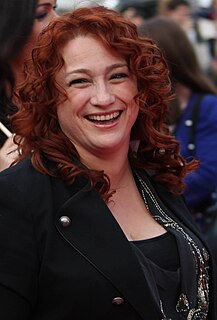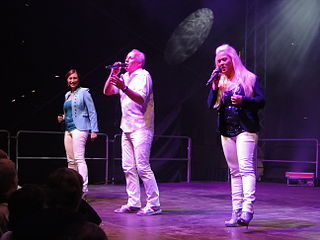
Dana Rosemary Scallon, known professionally as Dana, is an Irish singer and former politician who served as Member of the European Parliament from 1999 to 2004.

The Eurovision Song Contest 1973 was the 18th edition of the annual Eurovision Song Contest. It took place in Luxembourg City, Luxembourg, following the country's victory at the 1972 contest with the song "Après toi" by Vicky Leandros. It was the third time the event took place in Luxembourg; after the 1962 and 1966 editions. Organised by the European Broadcasting Union (EBU) and host broadcaster Compagnie Luxembourgeoise de Télédiffusion (CLT), the contest was held at the Grand Théâtre on Saturday 7 April 1973 and was hosted by Helga Guitton.

Gigliola Cinquetti is an Italian singer, songwriter, actress and television presenter.

Linda Martin is a singer and television presenter from Northern Ireland. She is best known in Europe as the winner of the 1992 Eurovision Song Contest with the song "Why Me?", and in Ireland as a member of the 1970s/1980s band Chips.

Niamh Kavanagh is an Irish singer who sang the winning entry at the Eurovision Song Contest 1993.

Ireland has participated in the Eurovision Song Contest 54 times since making its debut at the 1965 contest in Naples, missing only two contests since then. The contest final is broadcast in Ireland on RTÉ One. Ireland has a record total of seven wins, and is the only country to have won three times consecutively.

Wind is a German musical group that mostly plays schlager music. The band is still active, more than 30 years after its foundation.

"Die Sommermelodie" was the West-German entry in the Eurovision Song Contest 1974, performed in German by Cindy & Bert. Lyrics were by Kurt Feltz, while the composer, Werner Scharfenberger, also took care of conducting the orchestra for this entry – his only appearance in Eurovision.

"Open Your Heart" was the Icelandic entry in the Eurovision Song Contest 2003, performed in English by Birgitta.

"Come Back to Stay" was the Irish entry in the Eurovision Song Contest 1966, performed in English by Dickie Rock. The song was written by a 22-year old panel beater from Dublin named Rowland Soper. It was "his first serious attempt at song writing" and according to Rowland, "took him 10 minutes to write." 1966 would be the second year Dickie competed in the Irish National Song Contest and he would compete two more times, but did not make it to the Eurovision again

"Do I Dream" was the Irish entry in the Eurovision Song Contest 1973, performed in English by Maxi.

Lena Valaitis is a Lithuanian–German schlager singer who had her greatest success during the 1970s and 1980s. She finished second at the 1981 Eurovision Song Contest.
Maxi is a former musician and radio presenter in the Republic of Ireland. Maxi performed with two girl groups and the Irish supergroup The Concerned in the 1970s–80s, also representing Ireland at the 1973 and 1981 Eurovision Song Contests. After an automobile accident left her hospitalized, she focused on becoming a presenter for Raidió Teilifís Éireann; she retired from the broadcaster in 2015 after 30 years therewith.

"I See a Star" was the Dutch entry in the Eurovision Song Contest 1974, performed in English by Mouth & MacNeal.

"Aldri i livet" was the Norwegian entry in the Eurovision Song Contest 1981, performed in Norwegian by Finn Kalvik.
Philomena "Phil" Tully, known by the stage name Tina Reynolds or simply Tina, is an Irish singer.

Anne-Karine Strøm is a Norwegian singer, best known for having taken part in the Norwegian Eurovision Song Contest selection, Melodi Grand Prix, in six consecutive years between 1971 and 1976, winning on three occasions and representing Norway in the Eurovision Song Contests of 1973, 1974 and 1976.
Ireland participated in the Eurovision Song Contest 2010 with the song "It's for You" written by Niall Mooney, Mårten Eriksson, Jonas Gladnikoff and Lina Eriksson. The song was performed by Niamh Kavanagh, who had previously represented Ireland in the Eurovision Song Contest in 1993 where she won the contest with the song "In Your Eyes". The Irish broadcaster Raidió Teilifís Éireann (RTÉ) organised the national final Eurosong 2010 in order to select the Irish entry for the 2010 contest in Oslo, Norway. Five songs faced the votes of six regional juries and a public televote, ultimately resulting in the selection of "It's for You" performed by Niamh Kavanagh as the Irish Eurovision entry.
Ireland was represented by Tina Reynolds, with the song '"Cross Your Heart", at the 1974 Eurovision Song Contest, which took place on 6 April in Brighton, England. "Cross Your Heart" was chosen as the Irish entry at the national final on 9 February.
Geraldine Brannigan,, known professionally as Géraldine, is an Irish singer, known for finishing in fifth place in the Eurovision Song Contest 1975 with the song "Toi" while representing Luxembourg.















